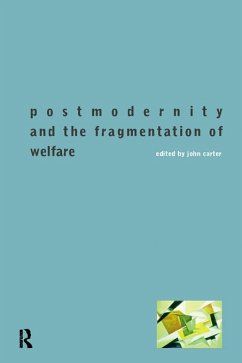Postmodernity and the Fragmentation of Welfare (eBook, PDF)
Redaktion: Carter, John
51,95 €
51,95 €
inkl. MwSt.
Sofort per Download lieferbar

26 °P sammeln
51,95 €
Als Download kaufen

51,95 €
inkl. MwSt.
Sofort per Download lieferbar

26 °P sammeln
Jetzt verschenken
Alle Infos zum eBook verschenken
51,95 €
inkl. MwSt.
Sofort per Download lieferbar
Alle Infos zum eBook verschenken

26 °P sammeln
Postmodernity and the Fragmentation of Welfare (eBook, PDF)
Redaktion: Carter, John
- Format: PDF
- Merkliste
- Auf die Merkliste
- Bewerten Bewerten
- Teilen
- Produkt teilen
- Produkterinnerung
- Produkterinnerung

Bitte loggen Sie sich zunächst in Ihr Kundenkonto ein oder registrieren Sie sich bei
bücher.de, um das eBook-Abo tolino select nutzen zu können.
Hier können Sie sich einloggen
Hier können Sie sich einloggen
Sie sind bereits eingeloggt. Klicken Sie auf 2. tolino select Abo, um fortzufahren.

Bitte loggen Sie sich zunächst in Ihr Kundenkonto ein oder registrieren Sie sich bei bücher.de, um das eBook-Abo tolino select nutzen zu können.
This collection analyzes the potential challenge to the welfare state from postmodern ideas. Contributors explore the relevance of theories of diversity and difference to mainstream and critical social policy.
- Geräte: PC
- mit Kopierschutz
- eBook Hilfe
- Größe: 3.32MB
Andere Kunden interessierten sich auch für
![Critical Realism for Welfare Professions (eBook, PDF) Critical Realism for Welfare Professions (eBook, PDF)]() Critical Realism for Welfare Professions (eBook, PDF)42,95 €
Critical Realism for Welfare Professions (eBook, PDF)42,95 €![Responsibilisation at the Margins of Welfare Services (eBook, PDF) Responsibilisation at the Margins of Welfare Services (eBook, PDF)]() Responsibilisation at the Margins of Welfare Services (eBook, PDF)45,95 €
Responsibilisation at the Margins of Welfare Services (eBook, PDF)45,95 €![The Handbook of Separation and Divorce (eBook, PDF) The Handbook of Separation and Divorce (eBook, PDF)]() Wendy MantleThe Handbook of Separation and Divorce (eBook, PDF)46,95 €
Wendy MantleThe Handbook of Separation and Divorce (eBook, PDF)46,95 €![Women and the Welfare State (eBook, PDF) Women and the Welfare State (eBook, PDF)]() Elizabeth WilsonWomen and the Welfare State (eBook, PDF)49,95 €
Elizabeth WilsonWomen and the Welfare State (eBook, PDF)49,95 €![Welfare Conditionality (eBook, PDF) Welfare Conditionality (eBook, PDF)]() Beth WattsWelfare Conditionality (eBook, PDF)40,95 €
Beth WattsWelfare Conditionality (eBook, PDF)40,95 €![The Routledge Handbook of Social Work Theory (eBook, PDF) The Routledge Handbook of Social Work Theory (eBook, PDF)]() The Routledge Handbook of Social Work Theory (eBook, PDF)48,95 €
The Routledge Handbook of Social Work Theory (eBook, PDF)48,95 €![The Anthropology of Welfare (eBook, PDF) The Anthropology of Welfare (eBook, PDF)]() The Anthropology of Welfare (eBook, PDF)51,95 €
The Anthropology of Welfare (eBook, PDF)51,95 €-
-
-
This collection analyzes the potential challenge to the welfare state from postmodern ideas. Contributors explore the relevance of theories of diversity and difference to mainstream and critical social policy.
Hinweis: Dieser Artikel kann nur an eine deutsche Lieferadresse ausgeliefert werden.
Dieser Download kann aus rechtlichen Gründen nur mit Rechnungsadresse in A, B, BG, CY, CZ, D, DK, EW, E, FIN, F, GR, HR, H, IRL, I, LT, L, LR, M, NL, PL, P, R, S, SLO, SK ausgeliefert werden.
Hinweis: Dieser Artikel kann nur an eine deutsche Lieferadresse ausgeliefert werden.
Produktdetails
- Produktdetails
- Verlag: Taylor & Francis eBooks
- Seitenzahl: 304
- Erscheinungstermin: 12. Oktober 2012
- Englisch
- ISBN-13: 9781134712991
- Artikelnr.: 38263158
- Verlag: Taylor & Francis eBooks
- Seitenzahl: 304
- Erscheinungstermin: 12. Oktober 2012
- Englisch
- ISBN-13: 9781134712991
- Artikelnr.: 38263158
- Herstellerkennzeichnung Die Herstellerinformationen sind derzeit nicht verfügbar.
John Carter is a Senior Lecturer in the School of Social Sciences, University of Teesside.
Contents. 1. Preludes, introductions and meanings John Carter Part 1
Postmodern frameworks and social policy 2. Studying social policy after
modernity John Carter 3. Postmodernism, poststructuralism ans social policy
John R. Gibbs 4. Oppositional postmodern theory and welfare analysis:
anti-oppressive practice in a postmodern frame Martin O'Brien and Sue Penna
5. Quality assurance and evaluation in social work in a postmodern era
Barbara Fawcett and Brid Featherstone Part 2 Critical social policy and
postmodernity 6. 'One step beyond': critical social policy in a
'postmodern' Britain? Kirk Mann 7. Postmodernity and the future of welfare:
whose critiques, whose social policy? Suzy Croft and Peter Beresford Part 3
Social divisions and social exclusion 8. New horizons? New insights?:
Postmodernising social policy and the case of sexuality Jean Carabine 9.
Reopening the gift: race and the critique of normative social policy Chris
Smaje 10. Individualisation processes and social policy: insecurity,
reflexivity and risk in the restructuring of contemporary British health
and housing policies Sarah Nettleton and Roger Burrows Part 4 Governance
and new technologies of control in the new social policy 11. Thriving on
chaos? Managerialisation and social welfare John Clarke 12. Performativity
and fragmentation in 'postmodern schooling' Stephen J. Ball 13. Post-Betty
Fordism and neo-liberal drug policies Robin Bunton 14. Welfare direct:
informatics and the emergence of self-service welfare? Brian D. Loader Part
5 Citizenship amid the fragmented nation state 15. The delivery of welfare:
the associationist vision Paul Hoggett and Simon Thompson 16.
Globalisation, fragmentation and local welfare citizenship Allan Cochrane
17. Postmodernity and social Europe Norman Ginsburg References. Name Index.
Subject index.
Postmodern frameworks and social policy 2. Studying social policy after
modernity John Carter 3. Postmodernism, poststructuralism ans social policy
John R. Gibbs 4. Oppositional postmodern theory and welfare analysis:
anti-oppressive practice in a postmodern frame Martin O'Brien and Sue Penna
5. Quality assurance and evaluation in social work in a postmodern era
Barbara Fawcett and Brid Featherstone Part 2 Critical social policy and
postmodernity 6. 'One step beyond': critical social policy in a
'postmodern' Britain? Kirk Mann 7. Postmodernity and the future of welfare:
whose critiques, whose social policy? Suzy Croft and Peter Beresford Part 3
Social divisions and social exclusion 8. New horizons? New insights?:
Postmodernising social policy and the case of sexuality Jean Carabine 9.
Reopening the gift: race and the critique of normative social policy Chris
Smaje 10. Individualisation processes and social policy: insecurity,
reflexivity and risk in the restructuring of contemporary British health
and housing policies Sarah Nettleton and Roger Burrows Part 4 Governance
and new technologies of control in the new social policy 11. Thriving on
chaos? Managerialisation and social welfare John Clarke 12. Performativity
and fragmentation in 'postmodern schooling' Stephen J. Ball 13. Post-Betty
Fordism and neo-liberal drug policies Robin Bunton 14. Welfare direct:
informatics and the emergence of self-service welfare? Brian D. Loader Part
5 Citizenship amid the fragmented nation state 15. The delivery of welfare:
the associationist vision Paul Hoggett and Simon Thompson 16.
Globalisation, fragmentation and local welfare citizenship Allan Cochrane
17. Postmodernity and social Europe Norman Ginsburg References. Name Index.
Subject index.
Contents. 1. Preludes, introductions and meanings John Carter Part 1
Postmodern frameworks and social policy 2. Studying social policy after
modernity John Carter 3. Postmodernism, poststructuralism ans social policy
John R. Gibbs 4. Oppositional postmodern theory and welfare analysis:
anti-oppressive practice in a postmodern frame Martin O'Brien and Sue Penna
5. Quality assurance and evaluation in social work in a postmodern era
Barbara Fawcett and Brid Featherstone Part 2 Critical social policy and
postmodernity 6. 'One step beyond': critical social policy in a
'postmodern' Britain? Kirk Mann 7. Postmodernity and the future of welfare:
whose critiques, whose social policy? Suzy Croft and Peter Beresford Part 3
Social divisions and social exclusion 8. New horizons? New insights?:
Postmodernising social policy and the case of sexuality Jean Carabine 9.
Reopening the gift: race and the critique of normative social policy Chris
Smaje 10. Individualisation processes and social policy: insecurity,
reflexivity and risk in the restructuring of contemporary British health
and housing policies Sarah Nettleton and Roger Burrows Part 4 Governance
and new technologies of control in the new social policy 11. Thriving on
chaos? Managerialisation and social welfare John Clarke 12. Performativity
and fragmentation in 'postmodern schooling' Stephen J. Ball 13. Post-Betty
Fordism and neo-liberal drug policies Robin Bunton 14. Welfare direct:
informatics and the emergence of self-service welfare? Brian D. Loader Part
5 Citizenship amid the fragmented nation state 15. The delivery of welfare:
the associationist vision Paul Hoggett and Simon Thompson 16.
Globalisation, fragmentation and local welfare citizenship Allan Cochrane
17. Postmodernity and social Europe Norman Ginsburg References. Name Index.
Subject index.
Postmodern frameworks and social policy 2. Studying social policy after
modernity John Carter 3. Postmodernism, poststructuralism ans social policy
John R. Gibbs 4. Oppositional postmodern theory and welfare analysis:
anti-oppressive practice in a postmodern frame Martin O'Brien and Sue Penna
5. Quality assurance and evaluation in social work in a postmodern era
Barbara Fawcett and Brid Featherstone Part 2 Critical social policy and
postmodernity 6. 'One step beyond': critical social policy in a
'postmodern' Britain? Kirk Mann 7. Postmodernity and the future of welfare:
whose critiques, whose social policy? Suzy Croft and Peter Beresford Part 3
Social divisions and social exclusion 8. New horizons? New insights?:
Postmodernising social policy and the case of sexuality Jean Carabine 9.
Reopening the gift: race and the critique of normative social policy Chris
Smaje 10. Individualisation processes and social policy: insecurity,
reflexivity and risk in the restructuring of contemporary British health
and housing policies Sarah Nettleton and Roger Burrows Part 4 Governance
and new technologies of control in the new social policy 11. Thriving on
chaos? Managerialisation and social welfare John Clarke 12. Performativity
and fragmentation in 'postmodern schooling' Stephen J. Ball 13. Post-Betty
Fordism and neo-liberal drug policies Robin Bunton 14. Welfare direct:
informatics and the emergence of self-service welfare? Brian D. Loader Part
5 Citizenship amid the fragmented nation state 15. The delivery of welfare:
the associationist vision Paul Hoggett and Simon Thompson 16.
Globalisation, fragmentation and local welfare citizenship Allan Cochrane
17. Postmodernity and social Europe Norman Ginsburg References. Name Index.
Subject index.







